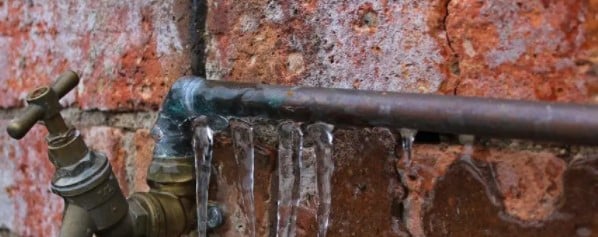Frozen pipes can do more damage to your home than you think. They can burst and flood your property. This can cause extensive water damage and cost you a lot of money. So, preventing frozen pipes is extremely important to ensure the safety of your home.
How do pipes freeze?
Water expands as it freezes. This puts a lot of pressure on whatever is carrying/containing it including plastic and metal pipes. Regardless of how sturdy the pipes are, expanding water can cause them to crack/break.
In our homes, pipes that are exposed to the direct, severe cold are prone to freezing. These include your swimming pool supply lines, water sprinkler lines, and other outdoor water pipes. Also, the pipes located in the unheated areas of the home such as crawl spaces, attics, and garages too are prone to freezing. In fact, any pipes that have little insulation and run along the exterior walls can freeze during extremely cold weather.
How can you prevent frozen pipes?
There are some simple steps you can take to prevent frozen pipes even during the harshest of weather.
- The most important thing to do is to insulate the pipes that are prone to freezing. Pay particular attention to pipes in crawl spaces, garage, attic, and near outside walls. You can easily find foam pipe covers from your local home improvement store.
- Before the onset of winter, you must drain water from the water sprinkler and swimming pool supply lines. It is recommended not to put antifreeze in these pipes unless directed.
- Seal all air leaks from your home as well as the garage to prevent cold air from getting in. Better insulation will keep these areas warm.
- Remove, drain and put away outdoor hoses and close inside valves that supply outdoor hose bibs. Ensure that there is no water remaining in the pipes.
- If some of the pipes in your house are prone to freeze, consider relocating them for added protection from freezing.
- When the water is too cold, let water drip from the faucets served by pipes that are exposed and prone to freezing.
- If you are going to be away from home during extremely cold weather, leave the heat on and set the thermostat to a temperature of at least 55 degrees.
The best way to prevent frozen pipes is to have a plumber look at your pipes, especially the ones that are prone to freezing, and let them recommend how best to deal with the problem.
How can you thaw frozen pipes?
If you open a faucet and all you get is a trickle, it is a sign that the pipe is frozen. Before you do anything, make sure you know the location of the master shutoff valve so that you can immediately shut the supply if the pipe breaks.
Apply heat to the frozen section using an electric hair dryer, an electric heating pad, or a hot towel wrapped around the pipe. Do not use any open flame device. Depending on the temperature outside and the extent of freezing, it may take up a few hours for the pipes to thaw. Once the pipe has thawed, let the water run and check for any leaks or cracks.
All this is helpful only if you know the location of the frozen area. In case you cannot locate the frozen area or it is not accessible, call a plumber right away. Also, if you have tried but you cannot thaw the pipe, do not try very hard, just call a plumber and they will do the job for you.




